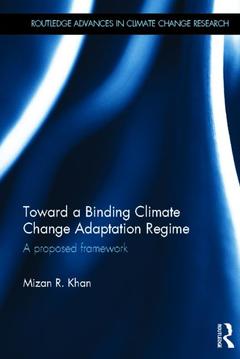Description
Toward a Binding Climate Change Adaptation Regime
A Proposed Framework
Routledge Advances in Climate Change Research Series
Author: Khan Mizan R.
Language: English
Subjects for Toward a Binding Climate Change Adaptation Regime:
Keywords
Adaptation; Biodiversity; Climate Change; Climate finance; Conservation; Durban platform; Environmental economics; Environmental policy; Environmental studies; Kyoto Protocol; Marrakech; Mitigation; Sustainability; Sustainable development; UNFCCC; carbon footprint; climate negotiations; climate policy; emmissions; greenhouse gas; Regulate GHG Emission; CDM Project; UNCTAD 2011a; Ap Ta; IPCC AR4; UNFCCC Process; Border Tax Adjustments; GHG Emission; IPCC 2007a; AF; Cancun Adaptation Framework; Global Public Good; Fast Start Finance; Annex Ii Party; IPCC 2007b; UN; Human Security; Contra Diction; Human Rights; Limit GHG Emission; Over Burden; Climate Justice; Pacific SIDS
Publication date: 10-2013
Support: Print on demand
Publication date: 08-2015
· 15.6x23.4 cm · Paperback
Description
/li>Contents
/li>Readership
/li>Biography
/li>
The impact of climate change is global both in its cause and its effect. Thus there is a global responsibility for international cooperation to tackle the causes through mitigation strategies such as those agreed at the Durban Platform of December 2011. This climate regime aims to define responsibilities, mechanisms, funding and compliance in order to achieve a clear objective regarding the reduction of greenhouse gas emissions. Although tackling the causes of climate change through mitigation is necessary, it is also essential to examine the effect of climate change and what international cooperation can take place to ensure global adaptation measures. This pioneering book deals exclusively with the politics of why adaptation as a global responsibility continues to be ignored.
Scientific consensus is that the impacts of climate change are increasing, as evident from the greater frequency, intensity and magnitude of climate disasters in recent years. This book asks why anticipatory and planned measures for reducing vulnerability to the impacts of climate change should not be regarded as a global responsibility in the same way as mitigation. This discrimination is likely to continue unless the framing and legal basis of adaptation can be strengthened. It is with this aim in place that Professor Khan utilises his experience in academia and as a negotiator to analyse the politics surrounding this important issue. In this book the author sets out a framework for establishing a legally-binding adaptation regime under the United Nations Framework Convention on Climate Change, with the view to reducing the gap between the strategic focus on mitigation and adaptation. This is invaluable research for students researching climate change from a variety of disciplinary perspectives, including the politics, law and economics of the issue.
Part One Chapter 1: Introduction - The Context and Niche of the Book Chapter 2: Climate Change Regime, Adaptation and Politics Chapter 3: Climate Finance: Supply, Demand and Governance Chapter 4: Reframing of Adaptation Framework Part Two Chapter 5: The Lens of Double Exposure: Climate Change and Uneven Chapter 6 The Lens of human and global security Chapter 7:Climate change, justice and human rights – A Logical Marriage Part Three Chapter 8: Polluter pays principle Chapter 9: Liability and compensation under Loss and Damage Chapter 10: Conclusion – Toward the proposed framework
Mizan R. Khan is Professor at the Department of Environmental Science and Management at North South University, Bangladesh, and currently a visiting scholar at Brown University, USA.




